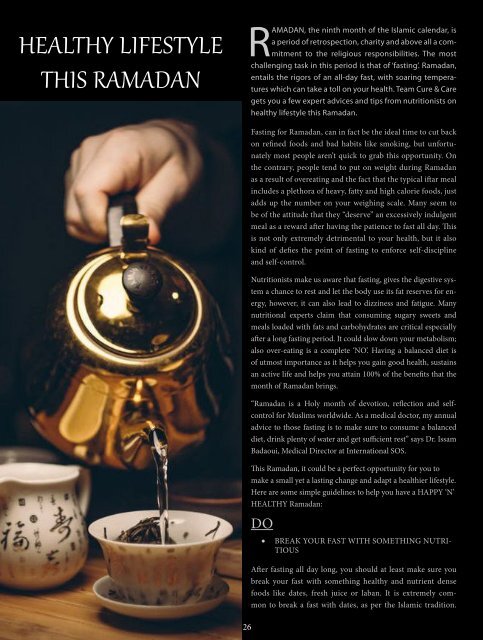Create successful ePaper yourself
Turn your PDF publications into a flip-book with our unique Google optimized e-Paper software.
HEALTHY LIFESTYLE<br />
THIS RAMADAN<br />
RAMADAN, the ninth month of the Islamic calendar, is<br />
a period of retrospection, charity <strong>and</strong> above all a commitment<br />
to the religious responsibilities. The most<br />
challenging task in this period is that of ‘fasting’. Ramadan,<br />
entails the rigors of an all-day fast, with soaring temperatures<br />
which can take a toll on your health. Team <strong>Cure</strong> & <strong>Care</strong><br />
gets you a few expert advices <strong>and</strong> tips from nutritionists on<br />
healthy lifestyle this Ramadan.<br />
Fasting for Ramadan, can in fact be the ideal time to cut back<br />
on refined foods <strong>and</strong> bad habits like smoking, but unfortunately<br />
most people aren’t quick to grab this opportunity. On<br />
the contrary, people tend to put on weight during Ramadan<br />
as a result of overeating <strong>and</strong> the fact that the typical iftar meal<br />
includes a plethora of heavy, fatty <strong>and</strong> high calorie foods, just<br />
adds up the number on your weighing scale. Many seem to<br />
be of the attitude that they “deserve” an excessively indulgent<br />
meal as a reward after having the patience to fast all day. This<br />
is not only extremely detrimental to your health, but it also<br />
kind of defies the point of fasting to enforce self-discipline<br />
<strong>and</strong> self-control.<br />
Nutritionists make us aware that fasting, gives the digestive system<br />
a chance to rest <strong>and</strong> let the body use its fat reserves for energy,<br />
however, it can also lead to dizziness <strong>and</strong> fatigue. Many<br />
nutritional experts claim that consuming sugary sweets <strong>and</strong><br />
meals loaded with fats <strong>and</strong> carbohydrates are critical especially<br />
after a long fasting period. It could slow down your metabolism;<br />
also over-eating is a complete ‘NO’. Having a balanced diet is<br />
of utmost importance as it helps you gain good health, sustains<br />
an active life <strong>and</strong> helps you attain 100% of the benefits that the<br />
month of Ramadan brings.<br />
“Ramadan is a Holy month of devotion, reflection <strong>and</strong> selfcontrol<br />
for Muslims worldwide. As a medical doctor, my annual<br />
advice to those fasting is to make sure to consume a balanced<br />
diet, drink plenty of water <strong>and</strong> get sufficient rest” says Dr. Issam<br />
Badaoui, Medical Director at International SOS.<br />
This Ramadan, it could be a perfect opportunity for you to<br />
make a small yet a lasting change <strong>and</strong> adapt a healthier lifestyle.<br />
Here are some simple guidelines to help you have a HAPPY ‘N’<br />
HEALTHY Ramadan:<br />
DO<br />
• BREAK YOUR FAST WITH SOMETHING NUTRI-<br />
TIOUS<br />
After fasting all day long, you should at least make sure you<br />
break your fast with something healthy <strong>and</strong> nutrient dense<br />
foods like dates, fresh juice or laban. It is extremely common<br />
to break a fast with dates, as per the Islamic tradition.<br />
26


